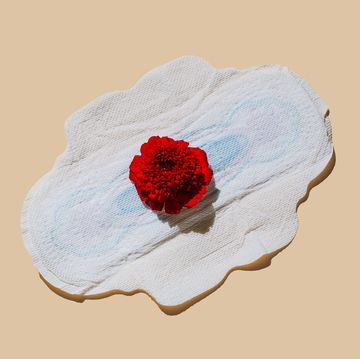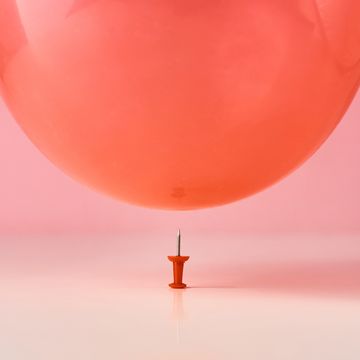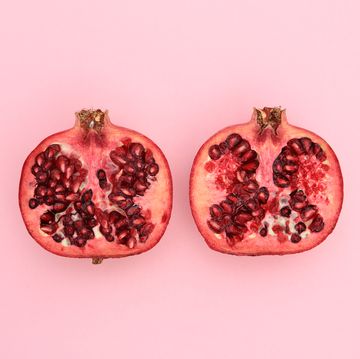 Amanda Becker
Amanda BeckerThe American Pregnancy Association suggests 20 percent of women spot during the first 12 weeks of pregnancy. That’s why if you have irregular bleeding, docs will want to rule out a baby-on-the-way, says Mamta Mamik, M.D., an assistant professor of obstetrics, gynecology, and reproductive science at the Icahn School of Medicine at Mount Sinai. FWIW, spotting in the early stages of pregnancy tends to be lighter than your usual period.
 Amanda Becker
Amanda BeckerTaking a blood thinner like Warfarin? “Typically, any kind of blood thinner can cause periods to be heavier and cause bleeding,” says Johnson. Supplements like ginkgo biloba also have blood-thinning properties that could affect your flow, adds Mamik. Of course, even birth control options like the NuvaRing, which contains estrogen and progestin (and alters hormone levels), could be the culprit, notes Johnson. So if you just started a new prescription and notice symptoms, mention that to your doc.
 Amanda Becker
Amanda BeckerSTDs can be tough to ID. In part, that’s because even if you have one, you probably don't know it: They often pop up without symptoms. But if you start noticing blood down there, particularly after sex, gonorrhea or chlamydia could be to blame, says Johnson. These STDs—as well as trichomoniasis and HPV—can cause inflammation on your cervix. And when your cervix is inflamed, it can bleed, says Johnson.
Advertisement - Continue Reading Below
 Amanda Becker
Amanda BeckerIt’s true: IUDs can lead to some irregular bleeding. Johnson says that about 25 percent of people who have ParaGard (the copper IUD) notice their periods get longer and heavier. Joy. As for the other kind of IUD, Mirena? Because it contains a small amount of levonorgestrel, a progestin hormone, it can cause random bleeding, too (at least for the first three to six months). The good news: Your typical period may get shorter and lighter. Oh, and if your IUD has moved or it’s not in the right place? Hello, blood on the undies—and you’ll probably experience discomfort, as well.
 Amanda Becker
Amanda BeckerOf course the mystical thyroid could be involved in vaginal bleeding. If you’re spotting, docs may worry about a low-functioning thyroid, says Mamik. What gives? A sub-par thyroid can affect your pituitary system, which has a cascade of effects on hormones and can, in some cases, lead to bleeding.
 Amanda Becker
Amanda BeckerYep, sometimes even sex can make you bleed. Usually, that’s because you were playing things a little too rough or weren’t wet enough. The result: a little tear just outside of the opening to your vagina, says Johnson. Assuming the tear isn’t causing too much discomfort (and you can pinpoint what caused it), it’ll likely clear by itself, no doctor needed. You just might want to take things a little easier the next time you get your freak on. (Or stock up on lube from the Women's Health Boutique!)
Advertisement - Continue Reading Below
 Amanda Becker
Amanda BeckerPCOS is categorized by an uptick in the male hormone testosterone, says Mamik. And that can cause problems when it comes to bleeding between cycles. “Testosterone can prevent estrogen from behaving in a normal manner,” she says. Some symptoms: a super long and heavy period, skipped periods, and going a long time between periods.
 Amanda Becker
Amanda BeckerHere’s why you need to take any bleeding between periods seriously: While it's uncommon, in a worst-case scenario, it could be a sign of pre-cancer or cancer of the uterus or cervix, says Johnson. This is particularly true if you’re already at an increased risk for these conditions (HPV makes you more susceptible). If you are, your doctor will likely want to run some tests to be on the safe side.

Cassie Shortsleeve is a skilled freelance journalist with more than a decade of experience reporting for some of the nation's largest print and digital publications, including Women's Health, Parents, What to Expect, The Washington Post, and others. She is also the founder of the digital motherhood support platform Dear Sunday Motherhood and a co-founder of the newsletter Two Truths Motherhood and the maternal rights non-profit Chamber of Mothers. She is a mom to three daughters and lives in the Boston suburbs.
Advertisement - Continue Reading Below
Advertisement - Continue Reading Below
Advertisement - Continue Reading Below






















